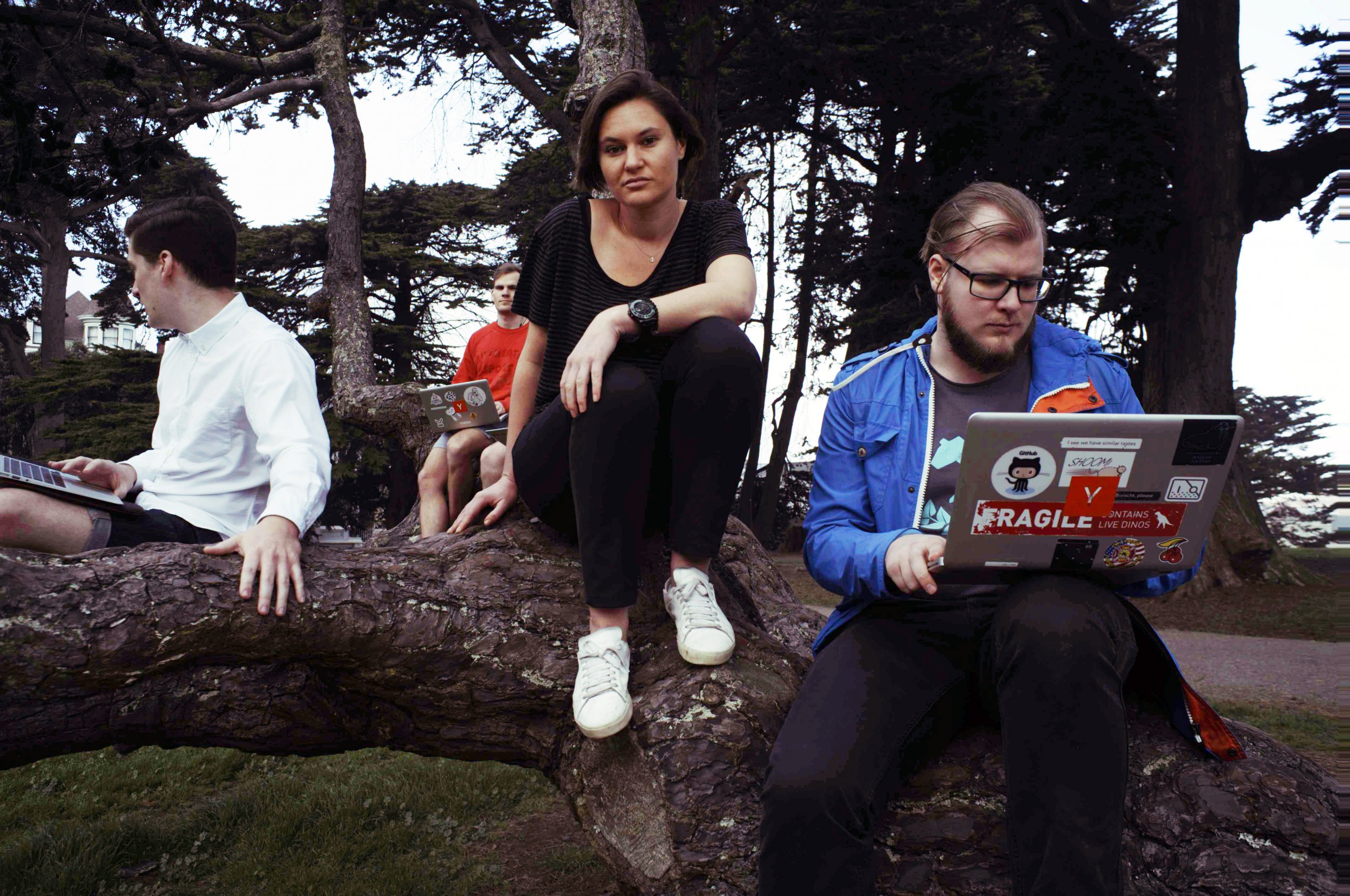
In a modest two-story house on Turk Street in San Francisco, a bunch of Russians, all in their 20s, live and work together to build an app they hope will change the way you choose a restaurant for dinner and, ultimately, the way customer service works.
The spacious living room of the house serves as an office; a whiteboard with a set of goals for the day stands beside the wall; laptops are often left unguarded on the table when members of team retire to their bedrooms to get some sleep. Up to 10 people live in the house, and most of them work at Luka, a startup building an app that recommends restaurants. The idea is that instead of sifting through ratings, professional reviews and other people's recommendations, like on Yelp or Foursquare, you can have a nice chat with a robot who presumably knows everything about good food and good fun, and learns more about you as you type. Another guy, the founder of Stampsy, a publishing platform for "visual thinkers," moved into the house recently.
All the residents came to the U.S. from Russia. And as it turns out, they are not that exceptional. In recent years, more and more young creative entrepreneurs from Russia have decided to pursue their dreams outside the country and launch their projects abroad—mostly in the U.S., but also in other Western countries, such as England. The extent of this migration is hard to quantify, since not everybody gets the right visas right away, but it's telling that the amount of two particular types of nonimmigrant visas granted by the U.S. embassy in Russia (L1, for employees, and O1, for "outstanding aliens") has been steadily growing over the last five years, with the amount of L1 visas doubling from 2009 to 2014.
"More and more Russian entrepreneurs are looking into relocating to the West or opening a branch outside Russia, and I actually think it's a positive a thing. I always urge people to think global," says Alon Lifshitz, managing director of Blumberg Capital, a venture capital firm with headquarters in San Francisco. "They are leaving the Russian market because there is a lack of liquidity, and the local stock exchange market is very unstable, because of everything that's going on. And Russian developers are actually very smart and capable, even though sometimes they lack in marketing and commercial abilities."
"Russian startups are very good on the tech side, but sometimes not that good on the product side," says Masha Drokova, a former prominent member of a Russian pro-government youth movement called Nashi. After falling out with the government's values, she says, she started doing social media campaigns, gradually was lured into the tech industry and is now running her own PR studio helping Russian and international startups to get the word out in the U.S. and globally. Drokova says every day she gets three or four e-mails from Russian companies asking her to help them with PR in the U.S. "After the economic crisis happened, it became very clear that there isn't simply a big enough tech market in Russia," she added.
Among the projects created by Russian millennials who have decided to compete in the overcrowded American and European markets instead of staying in their home country are Flёve Partners, a brand and design consulting agency, based in New York; Future London Academy, a project that organizes one-week inspirational and educational workshops in design, based in England; Hopes and Fears, an English-language digital media firm focused on "life and culture through a global lens," based in New York; San Jose-based Trucker Path, an app that connects drivers with clients, and which has been called "Uber for trucks" and just raised $20 million in Series A funding; Readymag, a Web publishing platform, based in New York; and so on.
The most well-known Russian digital runaway is arguably Pavel Durov, a co-founder and former CEO of the biggest Russian social network, VK.com. A Steve Jobs wannabe, a radical libertarian and a controversial Internet prodigy famous for such publicity stunts as throwing 5,000 ruble notes, worth about $150, out of his office window to show that "money is overrated," Durov was pushed out of VK by his stockholders in 2014 and forced to resign. He now lives abroad (he never says where exactly, but is often seen in New York) and runs Telegram, a popular instant messenger focused on the security of users' correspondence. In multiple interviews with the Western media, Durov has implied that the takeover of VK was orchestrated by the Kremlin. According to Durov, he repeatedly refused law enforcement's requests to block opposition and pro-Ukrainian groups and surrender their members' credentials. Citing other media obligations, Durov declined to comment for this article.
Considering the news that has been coming out of Russia in recent years, one might suspect the reasons for young professionals leaving the country is obvious. However, it's more subtle than that. The reasons appear to be not so much political as economic—and even existential. In five interviews conducted for this article, the name "Putin" was not mentioned once. It's not exactly about oppression, censorship and war; it's more about the consequences of those things. Russia, it seems, is just bad for business.
"We knew from the beginning that America is our primary market, and if you want to work there, you have to be there. It was just more convenient for us to enter an existing market instead of starting from ground zero," said Diana Novichikhina, a co-founder of ReadyMag, which boasts having The Guardian, BBDO and Airbnb among its 45,000 customers. She also said political concerns haven't influenced the startup's strategy.
"We like it in Moscow, but there just aren't so many good professionals there, so they crowd together, and it gets cramped," said Vit Abrams, who together with Holga Balina created Flёve Partners., an agency that works with clients like BP and won multiple design awards. "It's easy to get noticed in Moscow, because it's a plain field: if you stand out, you get noticed immediately. But there's no real ecosystem. Here, it's tougher, but you actually have a chance to become big and global."
For Ekaterina Solomeina, a co-founder of Future London Academy who worked with the best known Moscow design agencies before moving to London, creating an ecosystem in Moscow was actually one of the goals she had in mind when starting her project. "The Russian design industry is so young, there isn't much to be inspired by," she told Newsweek. "In London, you're surrounded by the best people, and you can learn from them and grow. And I want people to come here and then come back and share what they learned."
The Future London Academy was initially created to provide educational experiences and workshops to Russian designers, but now caters to audience from all over the world. Essentially, the participants of various programs organized by the Academy (for example, "Design Management: Creative Booster") pay to come to the British capital for a week to get introduced to the representatives of top British design firms and learn and get inspiration from them. The fee is usually somewhere in between 1,500 and 2,000 pounds ($2,300-$3,100) and includes accommodation in London.
"I didn't leave Moscow because I didn't like it," Solomeina said. "I was too young to have any real problems in Russia, and Moscow is almost a country in itself anyway. I just liked London more."
According to Roman Mazurenko, a founder of Stampsy who, as a Moscow cultural entrepreneur, helped the Russian hipster generation to evolve and find its identity in the mid-2000s, the spirit of the Russian capital nowadays just doesn't fit people who want to keep up with the rest of the world and be on the cutting edge.
"In 2007, Moscow wasn't really up-to-date either, but there was a dream," he told Newsweek. "Now the dream is gone. Nowadays, moving around the world isn't about geography, it's about time travel. Some countries still live in the '80s, others are going back there quickly; I am from Belorussia and I already saw everything that's now going on in Russia happening there. The U.S., however, is a very progressive country. And it's very important for a startup to live in the future."
Not unlike Russian music bands that try to break into America, Russian digital entrepreneurs don't specifically present themselves as Russian. Vasily Esmanov, the founder of Hopes & Fears who created the prominent independent media company Look At Me in Russia before expanding to New York, declined to be interviewed on the subject. "Our projects are good regardless of the fact where we're from," he said.
Indeed, there have been notable successes. Last year, Luka became the first Russian startup to be accepted into Y Combinator, which landed first place in a Forbes survey of American startup incubators in 2012. That allowed Luka's team to relocate to California, where now they are closing Series A funding.
Luka founder Eugenia Kuyda, who was a well-known food writer in Moscow before getting an MBA at London Business School and becoming a digital entrepreneur, explained her reasons for moving like this: "I feel like it makes sense to do politics in Russia nowadays, or charity work. Digital startups, though, feel kind of out of place.... When you're young, you want to dream big, to imagine where you will be in 10 years, and in Russia only insane people can seriously do that."
"It's just weird to think long-term if in a month the ruble can lose half of its value, in two months banks can close, and at any point somebody can come and just take over your company."
Uncommon Knowledge
Newsweek is committed to challenging conventional wisdom and finding connections in the search for common ground.
Newsweek is committed to challenging conventional wisdom and finding connections in the search for common ground.
About the writer
To read how Newsweek uses AI as a newsroom tool, Click here.








